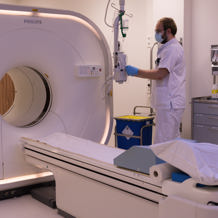Gastrointestinal stromal tumor (GIST)
Gastrointestinal stromal tumors (GIST) are rare tumors in the gastrointestinal tract. These kinds of tumors don’t develop in the mucus membrane lining – unlike more common tumors such as esophageal, stomach, or rectal cancer – but instead, grow in the organ’s connective or supportive tissue. GISTs are sarcomas; soft tissue tumors. GISTs are the most common sarcomas found in the gastrointestinal tract, although only 2% of all GI tumors are GIST.
Read more about the symptoms and the most common tests and treatments for gastrointestinal stromal tumors (GIST) on this page.
Click here for more information about the NKI sarcomas and GIST center, our specialists, patient satisfaction rates, and innovation.
Causes and symptoms gastrointestinal stromal tumor
Random genetic mutations in the supportive lining of the gastrointestinal tract cause uncontrollable cell division, which will result in a tumor; a GIST. These tumor types can develop throughout the entire GI tract, but occur most frequently in the stomach and small intestine.
- stomach: 50-60%
- small intestine: 20-30%
- rectum: 10%
- colon: 5%
- esophagus: 5%
GISTs have an estimated incidence of approximately 1.5 per 100,000 persons a year. This means that about 250 new patients are diagnosed with GIST every year.
Most GISTs develop without a clear cause, so there are no clear risks as far as we know. For about 5% of patients, tumor development has a hereditary cause.
Smaller tumors (<2 cm) often don’t cause any symptoms and are generally discovered by chance during a different examination. Larger GIST can cause specific symptoms that can be split into two groups: problems caused by the mass, or by bleeding.
Examples of problems caused by the mass can be:
- abdominal pain;
- nausea;
- constipation
- or a noticeable swelling in the abdomen.
You may experience blood loss through the stomach or intestines, or fatigue as a result of anemia.
Collaboration and scientific research GIST
Five specialized hospitals throughout the Netherlands formed a collaborative alliance: the Dutch GIST consortium, consisting of the Netherlands Cancer Institute, Erasmus MC, Radboud UMC, UMC Groningen, and the LUMC. Medical specialists from various disciplines (pathologists, radiologists, surgeons, medical oncologists) come together for the consortium to evaluate national guidelines and discuss new studies and results. A GIST database of patient details is an important source of information.

 nl
nl
 Nederlands (Nederland)
Nederlands (Nederland)
 English (United States)
English (United States)





